#viktor medvedchuk
Text
What Russia can't win on the battlefield it will try to accomplish with disinformation, propaganda, and plain old bribery.
A Russian cabal operated a propaganda site masquerading as a news site called the Voice of Europe. In addition to publishing items designed to undermine confidence in various European governments, it outright made payoffs to various EU politicians.
Investigators claimed it used the popular Voice of Europe website as a vehicle to pay politicians.
The Czech Republic and Poland said the network aimed to influence European politics.
Voice of Europe did not respond to the BBC's request for comment.
Czech media, citing intelligence sources, reported that politicians from Germany, France, Poland, Belgium, the Netherlands and Hungary were paid by Voice of Europe in order to influence upcoming elections for the European Parliament.
The German newspaper Der Spiegel said the money was either handed over in cash in covert meetings in Prague or through cryptocurrency exchanges.
Pro-Russian Ukrainian oligarch Viktor Medvedchuk is alleged by the Czech Republic to be behind the network.
Mr Medvedchuk was arrested in Ukraine soon after the Russian invasion, but later transferred to Russia with about 50 prisoners of war in exchange for 215 Ukrainians. '
Czech authorities also named Artyom Marchevsky, alleging he managed the day-to-day business of the website. Both men were sanctioned by Czech authorities.
Poland's intelligence agency said it had conducted searches in the Warsaw and Tychy regions and seized €48,500 (£41,500) and $36,000 (£28,500).
"Money from Moscow has been used to pay some political actors who spread Russian propaganda," BIS said in a statement.
It added that the sums amounted to "millions" of Czech crowns (tens of thousands of pounds).
I went looking for the Voice of Europe site but it is now missing (Hmm. We’re having trouble finding that site). So I held my nose and visited their Twitter account and nothing new has been posted since the scandal broke.
We need to be careful when looking at news online. Recently a series of fake sites pretending to be legit US news sources was uncovered.
Russia-Backed ‘Fake News Organizations’ Revealed Across the U.S. in Bombshell New York Times Report
The fake news sites have names that sound like they are legit but aren't. Examples: D.C. Weekly, the New York News Daily, the Chicago Chronicle, and the Miami Chronicle. There is a legit New York Daily News – note the different word order from the fake. There once was a newspaper called the Chicago Chronicle but it folded during the Theodore Roosevelt administration.
Google News searches spew a lot of crap. In a lot of cases the "news" sources on Google are just the proverbial guy in his underwear in his mom's basement posting bullshit. They may not be Russian but they are often dubious.
It's best to create a bookmark folder of known legit news sources. There are still numerous good sources not behind paywalls. And many countries have public broadcasters who post news in English. Just a few: NPR, BBC, DW, CBC, ABC (Australia), RFI, YLE, Radio Sweden | Sveriges Radio, NHK-World, and even EER in Estonia.
When running across a news story which sounds peculiar, check to see if it's being reported in known legit media before posting or sharing it.
There are national elections this year in a number of countries including India, the US, and (probably) the UK. Don't inadvertently assist Putin's effort to spread disinformation and sow chaos.
#russian disinformation#russia#propaganda#fake news organizations#voice of europe#bezpečnostní informační služba#agencja bezpieczeństwa wewnętrznego#polska#česko#viktor medvedchuk#artyom marchevsky#дезинформация#артем марчевский#виктор медведчук#россия#владимир путин#путин хуйло#україна переможе#stand with ukraine
14 notes
·
View notes
Text
Βασίλης Μηλιώνης: Η Tikun Olam Ελλάδος, η κάνναβη και οι αναφορές των τραπεζών στην Αρχή για το Ξέπλυμα
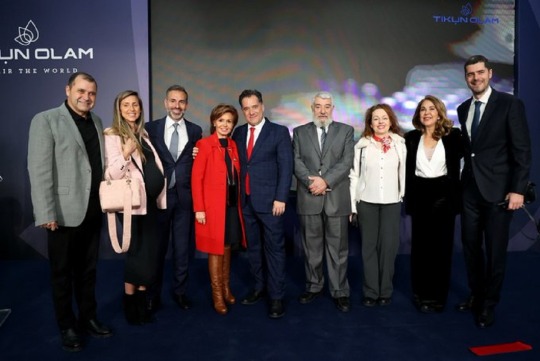
View On WordPress
#Darklemon Enterprises#Hellas Power#ΒΑΣΙΛΗΣ ΜΗΛΙΩΝΗΣ#ΝΙΚΟΣ ΚΑΡΑΝΙΚΑΣ#Livly Ltd#Tikum Olam#Tikun Olam Ελλάδος Α.Ε.#Tikun Olam Ltd#Viktor Medvedchuk
0 notes
Text
Βασίλης Μηλιώνης: Η Tikun Olam Ελλάδος, η κάνναβη και οι αναφορές των τραπεζών στην Αρχή για το Ξέπλυμα
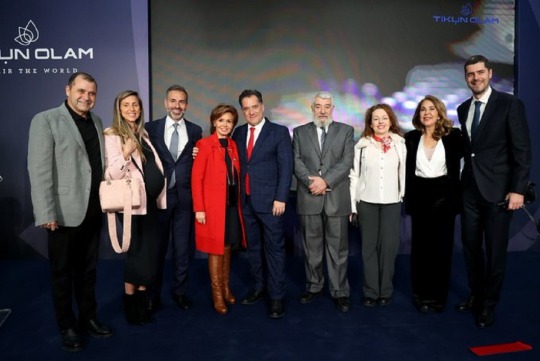
View On WordPress
#Darklemon Enterprises#Hellas Power#ΒΑΣΙΛΗΣ ΜΗΛΙΩΝΗΣ#ΝΙΚΟΣ ΚΑΡΑΝΙΚΑΣ#Livly Ltd#Tikum Olam#Tikun Olam Ελλάδος Α.Ε.#Tikun Olam Ltd#Viktor Medvedchuk
0 notes
Text
Why Ukraine sanctioned Putin’s ally Medvedchuk
by Andriy Yermak
Published on February 26, 2021
On the morning of February 20, one of Ukraine’s most powerful men awoke to find himself on a sanctions list issued by his own country. Sanctioning one of your own is a serious step that should only be considered in the most unusual and extreme of circumstances. This is exactly what we currently face in Ukraine.
Viktor Medvedchuk may not be a name that is particularly well-known to most Americans. In Ukraine, however, he is a towering figure. A businessman, politician, and TV mogul, Medvedchuk is co-chairman of Ukraine’s largest pro-Russian political party. He is a personal friend of Russian President Vladimir Putin, who is godfather to Medvedchuk’s daughter. He has also been the driving force behind three of Ukraine’s most fervently pro-Kremlin TV stations.
All this might be considered acceptable in a country that was not in a state of war, or one that was not in the midst of delicate peace negotiations. Sadly, today’s Ukraine is in exactly this predicament. Medvedchuk and his fifth column activities have been a thorn in the side of peace efforts ever since the conflict began in 2014.
Shocking new evidence of the Medvedchuk family’s treachery has recently emerged. Medvedchuk’s wife, along with the spouse of a close ally, were found to be channeling profits from their Russia-based oil facility towards the breakaway Kremlin-proxy “republics” in eastern Ukraine. This activity qualifies as the financing of terrorism under Ukrainian laws. For that reason, Medvedchuk, his wife, and their companies are now sanctioned.
Ukrainian President Volodmyr Zelenskyy was elected by a landslide majority in spring 2019 to deliver peace and a settlement to the conflict. We have come to the conclusion that as long as Medvedchuk openly subverts Kyiv’s efforts for a peaceful resolution, as long as he is able to seed discord, promote the Kremlin’s agenda, and spread disinformation in Ukraine, our country will remain at war.
Quite rightly, the administration of US President Barack Obama placed Viktor Medvedchuk on their own sanctions list immediately following the illegal annexation of Crimea in 2014. Unfortunately, Ukrainian President Petro Poroshenko did not follow suit. Instead, he agreed with President Putin to use Medvedchuk as an informal negotiator in talks with the Kremlin, despite knowing that Medvedchuk was actively trying to undermine Ukraine’s agenda.
We are now taking action to put an end to this state of affairs. In line with Ukrainian legislation, we have recently taken three TV channels off the air that were broadcasting pro-Russia disinformation. All three channels were linked to Medvedchuk.
From disinformation campaigns to the hacking of state institutions, the United States has first-hand experience of the kind of hybrid aggression Ukraine has been facing in recent years. To combat these tactics, Ukraine is currently working to set up a state disinformation unit to detect, monitor, and mitigate foreign-led campaigns.
Our intelligence agencies continue to uncover and neutralize cyber threats, while also regularly arresting foreign agents operating illegally in the country. We are committed to cooperating closely with our American allies and combining our efforts to tackle disinformation risks and other hybrid threats.
Under President Zelenskyy’s leadership, Ukraine has proven its relentless determination to deescalate the military situation in eastern Ukraine and save lives. We have completely overhauled the approach adopted by the previous administration towards the conflict.
In 2018, 122 Ukrainian servicemen were killed in eastern Ukraine. As a result of our efforts, the figure last year fell to 50. Tellingly, the only serious escalation in violence against Ukrainian forces since we implemented our new approach took place in recent weeks, shortly after the three TV stations linked to Medvedchuk were taken off the air.
Our ultimate objective is to reduce casualty numbers to zero, regain all Ukrainian territories that are currently occupied, and secure a long-lasting peace. We are confident that we will be able to achieve this overall goal with the help and support of our US partners.
Looking ahead, we have identified three priorities for US-Ukraine engagement.
Firstly, it is vital for the US to become fully engaged in the negotiation process under the Normandy and Minsk frameworks. A coordinated approach between the US, the EU, and Ukraine is indispensable.
Secondly, we must increase military cooperation between US and Ukraine in order to further raise the cost of any new military aggression. We need a clear signal from the United States concerning Ukraine’s NATO membership.
Thirdly, the United States should consider implementing a new and comprehensive sanctions regime until the war in Ukraine ends. This must remain in place until eastern Ukraine and Crimea return fully to Ukrainian control.
Any new sanctions should also give due consideration to Nord Stream 2, a pipeline project that threatens to seriously damage the Ukrainian economy and jeopardize energy security in Europe.
Ukraine and the United States are currently facing a civilizational choice: do we stand together to defend democracy, truth, and freedom, or do we yield to an authoritarian power which aggressively interferes in Western domestic affairs and invades other countries at will?
We in Ukraine are committed to working hand in hand with the new US Administration to defend our shared democratic values and the liberal world order, which remains the cornerstone of peace, freedom, and prosperity.
Andriy Yermak is the Head of the Presidential Office of Ukraine.
0 notes
Text
Illarionov told how many years Putin has been preparing a big war for Europe
Illarionov told how many years Putin has been preparing a big war for Europe
The former adviser to the President of the Russian Federation also named the names of three people who helped the head of the Kremlin to endure the idea of ”capturing” Ukraine
Putin has been preparing for war with Ukraine for 19 years. / Photo: Collage: Today
Russian President Vladimir Putin has been preparing a full-scale invasion of Ukraine for at least 19 years. The first evidence of such…
View On WordPress
0 notes
Text
Russian interference in the EU Parliament election: Czechia’s counterintelligence service said Thursday that it recently uncovered a Russian-backed “influence network” operating in the country with goal of influencing the upcoming European Parliament elections. The operation reportedly targeted politicians from Poland, Hungary, Germany, France, Belgium, and the Netherlands. Following the agency’s announcement, Czech Prime Minister Petr Fiala said Prague will impose new sanctions on Putin-aligned Ukrainian businessmen Viktor Medvedchuk and Artiom Marchevsky, as well as a company linked to Medvedchuk, for their roles in the scheme. The Polish broadcaster Polskie Radio, citing sources familiar with the case, reported that “money was allegedly provided” to politicians from German’s far right AfD party in Prague.
26 notes
·
View notes
Text
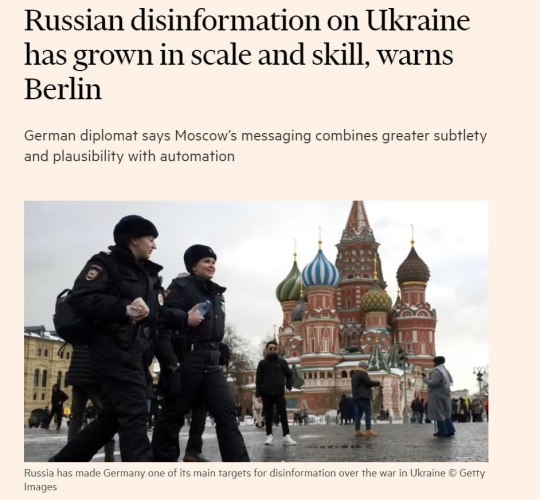
Russian disinformation campaigns aimed at undermining support for Ukraine in Europe have grown significantly in scope, skill, and stealth, reports the Financial Times.
Ralf Beste, head of the German Federal Foreign Office's culture and communication department, informed reporters that the Russian Federation is now combining greater sophistication and believability in its messages with automation to make information attacks more effective and harder to combat. Beste notes that "there's probably a lot going on that we don't even see."
"More and more conversations are taking place in private Telegram and WhatsApp channels. It is very difficult to understand what is happening there," the official says.
He added that in Germany, for example, the Russians target sensitive issues concerning the local population (such as the expansion of aid to Ukraine, the cessation of Russian gas supplies, doubts about further support from the United States within NATO, economic growth, etc.) and attempt to spread manipulative narratives on these topics.
This year, Beste's department uncovered one of the largest attempts to manipulate German public opinion on the X social network.
A network of over 50,000 fake accounts, posting up to 200,000 posts a day, sought to convince Germans that government aid to Ukraine undermined German prosperity and posed a threat of nuclear war. The network attempted to "launder" such statements by presenting them as if they had been published by Der Spiegel and Süddeutsche Zeitung.
Last week, the Czech government, in collaboration with other European states, exposed a network linked to oligarch Viktor Medvedchuk, which also disseminated pro-Russian and anti-Ukrainian narratives in Europe.
https://t.me/United24media/20328
24 notes
·
View notes
Text
The Wagner head, Yevgeny Prigozhin, has accused Moscow’s leadership of lying to the public about the justifications for invading Ukraine, in the latest sign of conflict between Vladimir Putin’s government and one of his most important allies.
In an explosive 30-minute video posted on his Telegram channel, Prigozhin dismissed Moscow’s claims that Kyiv was planning to launch an offensive on the Russian-controlled territories in eastern Ukraine in February 2022.
“There was nothing extraordinary happening on the eve of February 24,” Prigozhin said.
“The ministry of defence is trying to deceive the public and the president and spin the story that there was insane levels of aggression from the Ukrainian side and that they were going to attack us together with the whole Nato block,” the Wagner head said.
Shortly after Russia attacked Ukraine, Putin claimed Moscow’s invasion had thwarted Ukraine’s own plans for “a massive attack on the Donbas, and then on the Crimea”.
Prigozhin also said Russia’s leadership could have avoided the war by negotiating with Ukraine’s president, Volodomyr Zelenskiy.
“When Zelenskiy became president, he was ready for agreements. All that needed to be done was to get off Mount Olympus and negotiate with him,” he said.
Prigozhin has been arguing with top military officials for months, blaming the minister of defence, Sergei Shoigu, for battlefield failures.
However, his latest tirade appeared to be a new escalation, as the warlord directly contradicted Putin’s rationale for the invasion, implying it was based on lies in what amounts to the harshest criticism by any prominent Russian war figure of the decision to attack Ukraine.
“What was the war for? The war needed for Shoigu to receive a hero star … The oligarchic clan that rules Russia needed the war,” he said.
“The mentally ill scumbags decided: ‘It’s OK, we’ll throw in a few thousand more Russian men as cannon fodder. They’ll die under artillery fire, but we’ll get what we want,’” Prigozhin continued.
While the warlord was careful not to directly attack the Russian president, Prigozhin did question several decisions made by Putin, including the Kremlin’s decision to exchange more than 100 captured Azov fighters for Viktor Medvedchuk, a close ally of Putin.
And in one instance, Prigozhin appeared to criticise the Russian president for continuing to self-isolate.
“We still have self-isolation in our country, and therefore none of the decision-makers have yet met [with military generals and discussed how to win the war]. They all talked on the phone.”
Prigozhin, whose Wagner troops have pulled back from Bakhmut, also attacked Russia’s current war efforts in the face of Ukraine’s counteroffensive.
Directly contradicting Putin’s claims that Moscow has fended off Kyiv’s counterattack, Prigozhin also accused the Russian military leadership of lying to the public about the scale of its losses and setbacks in Ukraine.
“The Russian army is retreating in all directions and shedding a lot of blood … What they tell us is the deepest deception.”
#current events#politics#russian politics#russo-ukrainian war#2022 russian invasion of ukraine#russia#yevgeny prigozhin#wagner group
88 notes
·
View notes
Text
The Glazyev tapes were first made public by Ukraine’s SBU [Security Service] in August 2016, with more recordings revealed during the trial (in absentia) of former Ukrainian President Viktor Yanukovych. They appear to be intercepted telephone conversations between Sergei Glazyev, a senior adviser to Russian President Vladimir Putin and various other figures, including Konstantin Zatulin, Director of the Russian Institute of CIS Countries who was declared persona non grata in Ukraine back in 2006 for activities linked with seeking Crimea’s secession from Ukraine.
The tapes unfortunately cover only a very small period of time – from 27 February to 3 March 2014. It is, however, very clear even from the conversations intercepted on those days that Glazyev and Zatulin were “financing” supposedly separatist protests in Crimea, Kharkiv, Odesa and Zaporizhya. The amounts of money mentioned are high enough to mean that this was no private venture on Glazyev’s part and easily enough to ensure a considerable number of paid ‘pro-Russian protesters’. It is equally evident that certain Ukrainian politicians (Vadim Kolesnichenko; Oleg Tsarev; Viktor Medvedchuk and Serhiy Kivalov), as well as one religious figure (Metropolitan Agafangel from the Orthodox Church under the Moscow Patriarchate) were, at very least, seen as allies.
On 27 February, for example, Zatulin mentions to Glazyev that he has already spent 25 thousand dollars, and that he needs a further fifty thousand by the next day. The money seems earmarked not only for Crimea, but for paying people in Kharkiv and Odesa.
Later that day, Zatulin reports that “we have financed Kharkiv, financed Odesa”. There are ‘applications’ from other regions, he adds, but that he’s put them on hold while the question of finance is resolved.
With regard to Crimea, Zatulin mentions that there are about six thousand people with Russian flags, and a few ‘talking heads’, but that two prominent pro-Russian politicians Sergei Aksyonov and Sergei Tskekov are nowhere to be seen. Glazyev uses vulgar language, adding: “and we fed them so much”. In the following conversation, it becomes clear that Glazyev does not support Aksyonov’s supposed ‘election’ as Crimean ‘leader’ on the afternoon of 27 February.
Of those six thousand pro-Russian demonstrators, it is likely that many were the ones brought in by coaches for a counter-demonstration to the 10 thousand-strong demonstration organized by the Mejlis (representative assembly) of the Crimean Tatar People on 26 February. It was that demonstration which almost certainly preventedv Russia’s plan of carrying off an apparently ‘parliamentary’ coup with pro-Russian politicians forcing through a ‘vote’ to change Crimea’s status.
One of the key ideas that Glazyev pushes during his conversations is that all ‘uprisings’ must appear to be from the local population. This had been the plan in Crimea on 26 February that the Crimean Tatars and other Ukrainians who gathered in support of Ukraine’s unity thwarted. The tapes show that the same attempts were planned in Odesa and Zaporizhya.
#ukraine#war in ukraine#russia#russian invasion of ukraine#politics#russo ukrainian war#russian invasion in ukraine#russian propaganda
53 notes
·
View notes
Text

Ralf Beste of Germany’s Foreign Office said the Russians were ‘looking for cracks of doubt or feelings of unease and trying to enlarge them’.
It is absolutely a threat we have to take seriously.
A network of more than 50,000 fake accounts posting as many as 200,000 posts a day sought to convince Germans that the government’s help for Ukraine was undermining German prosperity and risking nuclear war.
Russian disinformation campaigns to undermine support for Ukraine in Europe have grown significantly in scale, skill and stealth, one of Germany’s most senior diplomats has warned.
“It is absolutely a threat we have to take seriously,” Ralf Beste, head of the department for culture and communication at Germany’s Federal Foreign Office, told the Financial Times. “Overall, [there] is an increase in sophistication and impact to what we have seen before.”
Russia is combining greater subtlety and plausibility in its messaging with automation to make its disruptive attacks more effective and harder to combat, he said.
“There is probably a lot going on we can’t even see. More and more conversations are happening in private . . . channels on Telegram and WhatsApp. It is very difficult to understand what is happening there.”
Beste’s department has a dedicated cell that leads the German government’s efforts to track and stop Russia’s information operations overseas.
Germany has emerged as one of the Kremlin’s main targets for disinformation over the war in Ukraine. Under the government of Chancellor Olaf Scholz, Berlin has dramatically revised its security and defence policy and become the second-largest donor of military aid to Kyiv after Washington.
Disagreements over the shift run deep — particularly among supporters of Scholz’s own Social Democratic Party — and many Germans are concerned over economic growth and the impact of the country weaning itself from Russian gas supplies.
Beste said: “[The Russians] are looking for cracks of doubt or feelings of unease and trying to enlarge them.”
His department this year uncovered one of the biggest attempts to manipulate German public opinion yet, on the social media platform X.
A network of more than 50,000 fake accounts posting as many as 200,000 posts a day sought to convince Germans that the government’s help for Ukraine was undermining German prosperity and risking nuclear war.
The network sought to “launder” such claims by making them look as if they had been published as opinions in reputable news outlets such as Der Spiegel and Süddeutsche Zeitung. But it also simply sought to amplify existing anti-Ukrainian views and make them appear to be more widespread.
Last week the Czech government, acting with other European states, accused the Ukrainian oligarch Viktor Medvedchuk of secretly cultivating a network of influence among European politicians to spread pro-Russian narratives and undermine support for Kyiv.
Countering such efforts is hard, Beste said, and indicates the extent to which Russia has moved on from the days of running infamous “troll farms”, which employed real people to spread dissent, often in a clumsy and obvious manner.
Beste said: “[Now] it’s not just a question of information that is verifiably true or false. It’s more than that. It’s about skewing opinions. Trying to tilt the balance of debate. Or to convince people that the frame of the debate is different to what it is in reality.”
The techniques being used were more like “nudging”, he said, referring to the concept in behavioural science of using small social and informational cues to subtly shift opinion or action.
“If you say, for example, ‘there is increasing doubt that XYZ . . . ’ then you will make people more receptive to doubts about that topic,” Beste said. “They are taking elements of reality in these campaigns and then warping them to create a different impression.”
Trying to rebut such campaigns is hard because the basic elements are often unfalsifiable, and engaging can often counterproductively lend claims to credibility.
Artificial intelligence tools are also a serious concern because of their ability to mimic human behaviour.
“AI is clearly something we have to watch very carefully,” Beste said. “What I worry about is how it will be used to create the impression of interaction . . . You enter a de facto second world, not just fake pieces of information or fake films or pictures but an entire alternative information ecosystem.”
#ukraine#germany#i've seen at least two people mentioning the increasing amount of anti ukrainian discourse on tumblr
19 notes
·
View notes
Text
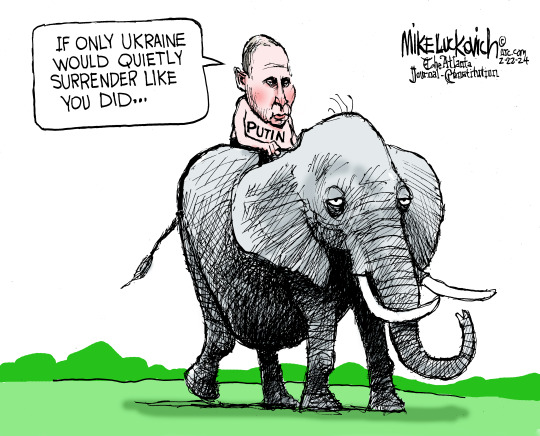
LETTERS FROM AN AMERICAN
March 29, 2024
HEATHER COX RICHARDSON
MAR 30, 2024
On Wednesday the nonprofit, nonpartisan Institute for the Study of War published a long essay explaining that Russia’s only strategy for success in Ukraine is to win the disinformation war in which it is engaged. While the piece by Nataliya Bugayova and Frederick W. Kagan, with Katryna Stepanenko, focused on Russia’s war against Ukraine, the point it makes about Russia’s information operation against Western countries applies more widely.
The authors note that the countries allied behind Ukraine dwarf Russia, with relative gross domestic products of $63 trillion and $1.9 trillion, respectively, while those countries allied with Russia are not mobilizing to help Russian president Vladimir Putin. Russia cannot defeat Ukraine or the West, they write, if the West mobilizes its resources.
This means that the strategy that matters most for the Kremlin is not the military strategy, but rather the spread of disinformation that causes the West to back away and allow Russia to win. That disinformation operation echoes the Russian practice of getting a population to believe in a false reality so that voters will cast their ballots for the party of oligarchs. In this case, in addition to seeding the idea that Ukraine cannot win and that the Russian invasion was justified, the Kremlin is exploiting divisions already roiling U.S. politics.
It is, for example, playing on the American opposition to sending our troops to fight “forever” wars, a dislike ingrained in the population since the Vietnam War. But the U.S. is not fighting in Ukraine. Ukrainians are asking only for money and matériel, and their war is not a proxy war—they are fighting for their own reasons—although their victory could well prevent U.S. engagement elsewhere in the future. The Kremlin is also playing on the idea that aid to Ukraine is too expensive as the U.S. faces large budget deficits, but the U.S. contribution to Ukraine’s war effort in 2023 was less than 0.5% of the defense budget.
Russian propaganda is also changing key Western concepts of war, suggesting, for example, that Ukrainian surrender will bring peace when, in fact, the end of fighting will simply take away Ukrainians’ ability to protect themselves against Russian violence. The authors note that Russia is using Americans’ regard for peace, life, American interests, freedom of debate, and responsible foreign relations against the U.S.
The authors’ argument parallels that of political observers in the U.S. and elsewhere: Russian actors have amplified the power of a relatively small, aggressive country by leveraging disinformation.
The European Union will hold parliamentary elections in June, and on Wednesday the Czech government sanctioned a news site called Voice of Europe, saying it was part of a pro-Russian propaganda operation. It also sanctioned the man running the site, Artyom Marchevsky, as well as Putin ally Viktor Medvedchuk, a Ukrainian oligarch, saying Medvedchuk was running a “Russian influence operation” through Voice of Europe.
The far right has been rising in Europe, and Nicholas Vinocur, Pieter Haeck, and Eddy Wax of Politico noted that “Voice of Europe’s YouTube page throws up a parade of EU lawmakers, many of them belonging to far-right, Euroskeptic parties, who line up to bash the Green Deal, predict the Union’s imminent collapse, or attack Ukraine.”
Belgian security services were in on the investigation, and on Thursday, Belgian prime minister Alexander De Croo added that Russian operatives had paid European Union lawmakers to parrot Russian propaganda. Intelligence sources told Czech media that Voice of Europe paid politicians from Belgium, France, Germany, Hungary, the Netherlands, and Poland to influence the upcoming E.U. elections. Germany’s Der Spiegel newspaper said the money was paid in cash or cryptocurrency.
Czech prime minister Petr Fiala wrote on social media: “We have uncovered a pro-Russian network that was developing an operation to spread Russian influence and undermine security across Europe.” "This shows how great the risk of foreign influence is," Dutch prime minister Mark Rutte told journalists. "It's a threat to our democracy, to our free elections, to our freedom of speech, to everything."
There are reasons to think the same disinformation process is underway in the United States. Not only do MAGA Republicans, including House speaker Mike Johnson (R-LA), parrot Russian talking points about Ukraine, but Russian disinformation has also been a key part of the House Republicans’ attempt to impeach President Joe Biden.
Republicans spent months touting Alexander Smirnov’s allegation that Biden had accepted foreign bribes, with Representative James Comer (R-KY) and Senator Chuck Grassley (R-IA) calling his evidence “verifiable” and “valuable.” In February the Department of Justice indicted Smirnov for creating a false record, days before revealing that he was in close contact with “Russian intelligence agencies” and was “actively peddling new lies that could impact U.S. elections.”
On March 19, former Rudy Giuliani associate Lev Parnas testified about the investigation into Biden’s alleged corruption before the House Oversight Committee at the request of the Democrats. Parnas was part of the attempt to create dirt on Biden before the 2020 election, and he explained how the process worked.
“The only information ever pushed about the Bidens and Ukraine has come from Russia and Russian agents,” Parnas said, and was part of “a much larger plan for Russia to crush Ukraine by infiltrating the United States.” Politicians and right-wing media figures, including then-representative Devin Nunes (R-CA), Senator Ron Johnson (R-WI), The Hill reporter John Solomon, Fox News Channel personality Sean Hannity, and other FNC hosts, knew the narrative was false, Parnas said, even as they echoed it. He suggested that they were permitting “Russia to use our government for malicious purposes, and to reward selfish people with ill-gotten gains.”
The attempt to create a false reality—whether by foreign operatives or homegrown ones—seems increasingly obvious in perceptions of the 2024 election. There has been much chatter, for example, about polls showing Trump ahead of Biden. But the 2022 polls were badly skewed rightward by partisan actors, and Democrat Marilyn Lands’s overwhelming victory over her Republican opponent in an Alabama House election this week suggests those errors have not yet been fully addressed.
Real measures of political enthusiasm appear to favor Biden and the Democrats. On Wednesday, Molly Cook Escobar, Albert Sun, and Shane Goldmacher of the New York Times reported that since leaving office, Trump has spent more than $100 million on legal fees alone. He is badly in need of money, and his reordering of the funding priorities of the Republican National Committee to put himself first means that the party is badly in need of money, too.
Donors’ awareness that their cash will go to Trump before funding other Republican candidates might well slow fundraising. Certainly, small-donor contributions to Trump have dropped off significantly: Brian Schwartz of CNBC reported last week that “[i]n 2023, Trump’s reelection campaign raised 62.5% less money from small-dollar donors than it did in 2019, the year before the last presidential election.”
Billionaires Liz and Dick Uihlein have recently said they will back Trump, and Alexandra Ulmer of Reuters reported on Tuesday that other billionaires had pooled the money to back Trump’s then–$454 million appeal bond before an appeals court reduced it. But Ulmer also noted that there might be a limit to such gifts, as they “could draw scrutiny from election regulators or federal prosecutors if the benefactors were to give Trump amounts exceeding campaign contribution limits. While the payment would not be a direct donation to Trump's campaign, federal laws broadly define political contributions as ‘anything of value’ provided to a campaign.”
Meanwhile, the fundraising of Biden and the Democrats is breaking records. Last night, in New York City, former presidents Bill Clinton and Barack Obama joined Biden onstage with television personality Stephen Colbert, along with event host Mindy Kaling and musical guests Queen Latifah, Lizzo, and Ben Platt. The 5,000-person event raised an eye-popping amount—more than $25 million—and the campaign noted that, unlike donations to Trump, every dollar raised would go to the campaign.
In his remarks, Biden said that the grassroots nature of the Democrats’ support showed in the number of people who have contributed so far to his campaign: 1.5 million in all, including 550,000 “brand-new contributors in the last couple of weeks.” Ninety-seven percent of the donations have been less than $200.
Tonight, Adrienne Watson, the spokesperson for the National Security Council, the president’s primary forum for national security and foreign policy, pointed to Russia’s devastating recent attacks on Ukraine’s energy grid and called again for Speaker Johnson to bring up the bipartisan national security supplemental bill providing aid to Ukraine that the Senate passed in February. She warned: “Ukraine’s need is urgent, and we cannot afford any further delays.”
LETTERS FROM AN AMERICAN
HEATHER COX RICHARDSON
#War in Ukraine#Russian disinformation#Heather Cox Richardson#Letters From An American#Russia#Putin#Mike Luckovich#National Security#propaganda wars#Right Wing propaganda
13 notes
·
View notes
Text

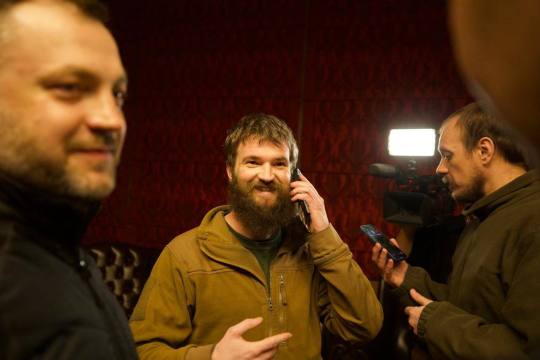





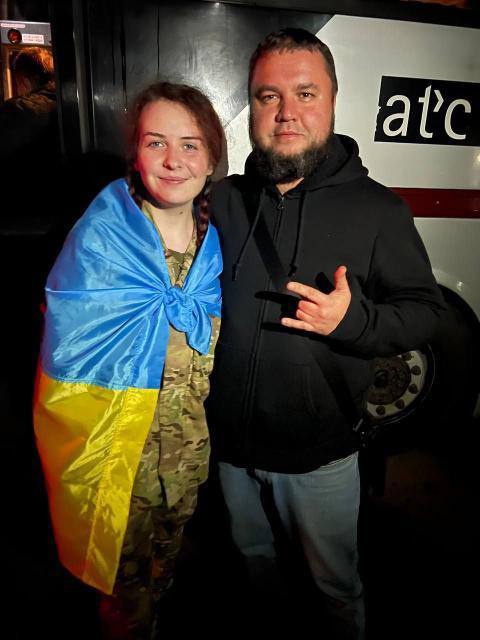
Mariupol defenders, our heroes are free!
This is the happiest moment for millions of Ukrainians.
Not gonna lie, I cried a little when I found out that Volyna and Ptashka/Birdie were among those released from russian captivity.
In total, 215 Ukrainian POWs were exchanged today.
And you know who they were exchanged for? Putin's bestie and godfather to his children, Ukrainian oligarch and prior to war, the Kremlin's main agent in Ukraine, Viktor Medvedchuk. He was given to Russia in exchange for our heroes.
What a spit in the face to countless of russian POWs. Putin is in no hurry to bring them back home, russian people are worthless to him, regime doesn't care for them. Oh, but putin's buddy, this is the most valuable and important person.
It's kinda hilarious.
Anyway, I'm so happy 😭
365 notes
·
View notes
Text
Russian propaganda pushed by the Kremlin has "infected" part of the Republican base, a senior GOP congressman has said, as indications grow that a vital U.S. military package for Ukraine will come up for a vote with U.S. lawmakers this month.
"I think Russian propaganda has made its way into the United States, unfortunately, and it's infected a good chunk of my party's base," House Foreign Affairs Committee chair and Texas Republican, Michael McCaul, told Puck News.
If you're wondering why so much "Fuck you if you vote for Biden!" chatter has been going around social media, that's why.
Meanwhile, in Europe:
A Russian-backed "propaganda" network has been broken up for spreading anti-Ukraine stories and paying unnamed European politicians, according to authorities in several countries.
Investigators claimed it used the popular Voice of Europe website as a vehicle to pay politicians.
The Czech Republic and Poland said the network aimed to influence European politics.
Voice of Europe did not respond to the BBC's request for comment.
Czech media, citing intelligence sources, reported that politicians from Germany, France, Poland, Belgium, the Netherlands and Hungary were paid by Voice of Europe in order to influence upcoming elections for the European Parliament.
The German newspaper Der Spiegel said the money was either handed over in cash in covert meetings in Prague or through cryptocurrency exchanges.
Pro-Russian Ukrainian oligarch Viktor Medvedchuk is alleged by the Czech Republic to be behind the network.
Mr Medvedchuk was arrested in Ukraine soon after the Russian invasion, but later transferred to Russia with about 50 prisoners of war in exchange for 215 Ukrainians.
When y'all share "Why bother voting, they're all the same?!?" propaganda, this is who benefits, Vladimir Putin, who's really hoping that he can bully the democracies of the world into letting him conquer Ukraine, and then move on to the rest of eastern Europe.
Georgia in 2008 was our annexation of the Sudetenland, Crimea in 2014 was the modern invasion of Czechoslovakia, and the 2022 invasion of Ukraine was the 21st century's equivalent to the 1939 invasion of Poland.
This is most likely our last, best, chance to stop World War 3 before it starts. Please vote for whoever isn't taking Putin's bribes, whoever in your country actually still believes in elections and isn't trying to install themselves as a far-right dictator. I'd rather not be drafted to go die in the trenches because we all couldn't agree that this was bad enough to work together to stop.
3 notes
·
View notes
Text
A Russian political influence campaign is shaking up Europe, as top officials warned Moscow paid European Parliament members to interfere in the upcoming EU election.
"This confirms what we have suspected: the Kremlin is using dodgy outlets pretending to be media [and] using money to buy covert influence,” European Commission Vice President Věra Jourová told Brussels Playbook, calling the revelations “very troubling.”
The scandal broke when the Czech government on Wednesday sanctioned a news site called Voice of Europe, which Prague said was part of a pro-Russian influence operation. Belgian Prime Minister Alexander De Croo said Thursday that Russia had approached EU parliament members (MEPs) and "paid [them], to promote Russian propaganda.”
The new Russian influence campaign comes with less than three months to go before the European Parliament election on June 6-9. It echoes concerns of corruption and foreign meddling brought to the fore by the Qatargate corruption scandal that rocked the European Parliament less than two years ago.
"We can't afford to be one step behind Putin and his propaganda army on a chess board ... We have to constantly bear in mind he will use the disinformation and foreign interference as a weapon to divide Europe," Jourová said.
The influence scandal revolved around the website Voice of Europe. The Czech foreign ministry sanctioned Ukrainian oligarch Viktor Medvedchuk, an ally of Russian President Vladimir Putin, as well as Voice of Europe itself and a person called Artem Pavlovich Marchevskyi presumed to be involved in the operation.
Medvedchuk was running a “Russian influence operation” from Russia on Czech territory using Voice of Europe, authorities said in a statement.
“This decision is in the security interest of the Czech Republic, as well as contributing to the protection of the democratic nature of the forthcoming elections to the European Parliament,” the Czech foreign ministry said.
Polish security services said Thursday they had carried out searches as part of the cross-border investigation in Warsaw and Tychy in western Poland, Reuters reported. Local media cited the security services' statement saying authorities had seized €48,500 and $36,000. Poland's Internal Security Agency's website has been down since Thursday evening.
Voice of Europe’s YouTube page throws up a parade of EU lawmakers, many of them belonging to far-right, Euroskeptic parties, who line up to bash the Green Deal, predict the Union’s imminent collapse, or attack Ukraine. There is no suggestion that those appearing on the network accepted cash.
The website has its roots in the Netherlands, Dutch daily NRC reported. An entrepreneur linked to the site at the time “worked with” far-right leader Thierry Baudet in 2016 “to bring about the Ukraine referendum,” the paper wrote, referring to a non-binding vote in which Dutch voters opposed a political association agreement between Ukraine and the EU.
Voice of Europe’s website was unavailable on Thursday and its account on X hasn’t posted since Wednesday.
"It is just a bitter joke to call this operation of Russian interference the 'Voice of Europe' but it shows clearly the level of despise Putin has towards our democracies," Jourová said.
The claim that MEPs were paid to speak up for the Kremlin has raised questions about who might have taken the cash.
A spokesperson for European Parliament President Roberta Metsola said in a statement: “The president is aware of the allegations being made and is looking into specific allegations.”
Italian European People's Party lawmaker Matteo Gazzini, who gave Voice of Europe an interview and participated in a panel debate alongside other MEPs, denied being offered or taking any money.
“Of course not, what a question is this?” he said. “It makes me laugh when you ask me if I got money from Russia … because I come from a very well-off family,” he said, adding that he is an agricultural and real estate entrepreneur who is only in politics to serve his country.
Asked about his comments on a Voice of Europe panel in which he said that Europe should not have the goal of defeating Russia, and instead focus on finding a path to peace in Ukraine, Gazzini said he condemned the invasion and that Russian troops should leave Ukraine. “At the same time, Europe should not help to escalate the situation,” he said.
He also blamed the European Parliament for letting Voice of Europe into the institution, where he said they first approached him. “If they are such a big threat, why [did] the European Parliament let these journalists inside? Why didn’t they check them?” he asked.
His EPP colleague Dennis Radtke, from Germany, said that Gazzini’s membership of the political group “has to be discussed.” Gazzini joined the EPP this year from the far-right Identity & Democracy grouping, having quit his League party to join Forza Italia.
“It underlines my skepticism with former members of Lega and the ID. Whoever is involved in this Russian network has to face consequences ... We have to defend our democracy and the integrity of our political institution,” Radtke wrote in a message.
A senior EPP group official said: “The EPP stands clearly and firmly on the side of Ukraine. We have been fighting against Putin‘s propaganda and disinformation for years and we will continue to do so.”
The S&D group joined others in calling for an urgent debate.
15 notes
·
View notes
Link
7 notes
·
View notes
Text
Was looking up info about Gutenberg Bibles, discovered that we had one in Ukraine - in the private ownership of Viktor Medvedchuk, aka putin's godfather, aka leader of the ""opposition""" """""pro-peace""""" currently-banned-pro-russian-party, aka one of the most powerful (former) oligarkhs in Ukraine, aka the person who would have been assigned as Gauleiter if russia had managed to occupy Ukraine completely, aka the dude who some communistically-inclined people try to present as an undeserving victim of anti-russian presecution and an innocent martyr.
And yes, if you guessed that the current whereabouts of the Bible are unknown and medvedchuk refused to share any information with the international scientific community, you guessed right
51 notes
·
View notes